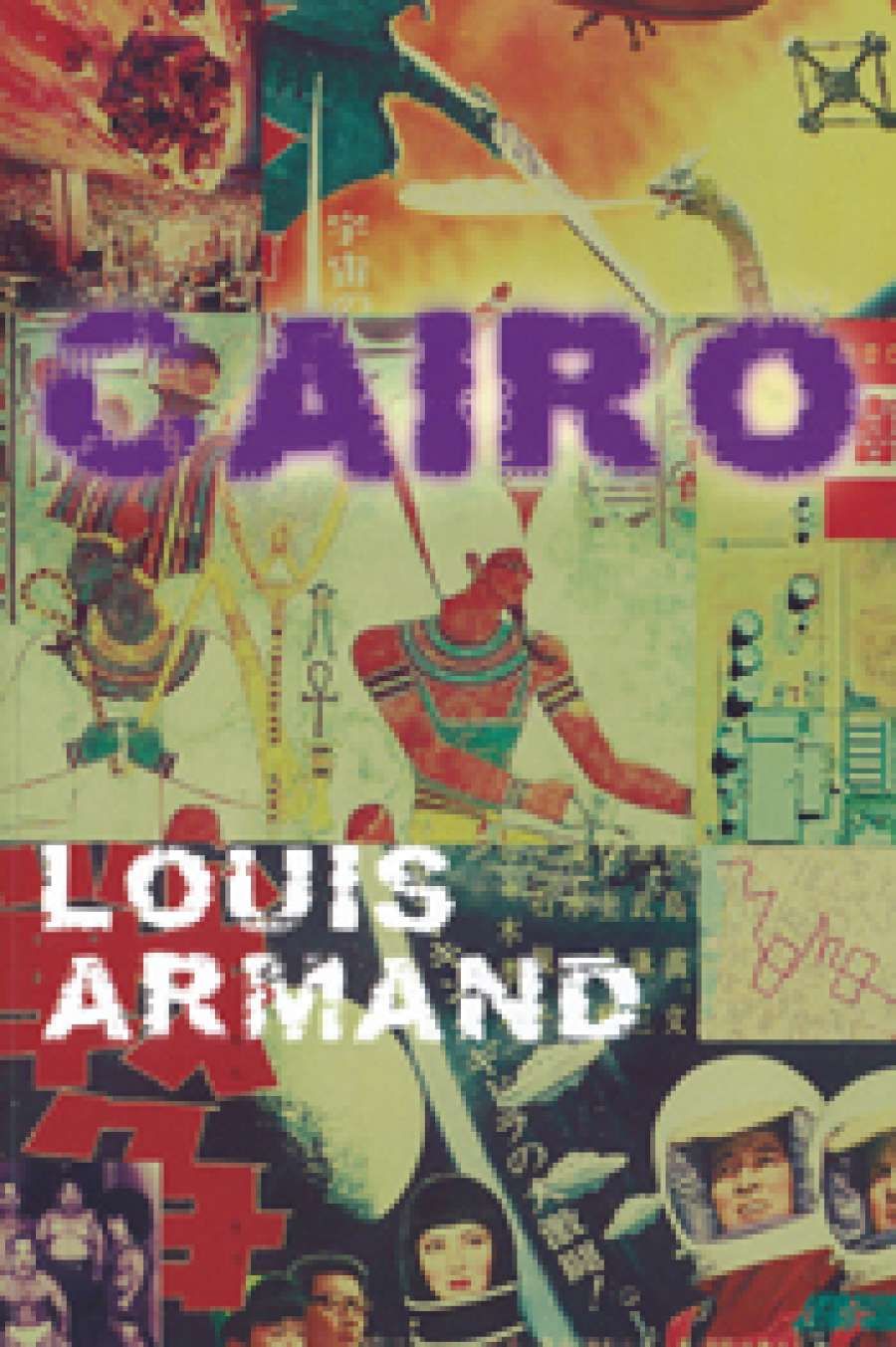
- Free Article: No
- Contents Category: Fiction
- Review Article: Yes
- Article Title: Palimpsest
- Online Only: No
- Custom Highlight Text:
Science fiction, for all its association with wild technology and alien cultures, has always concerned itself with the state of the world as it is now, using future possibilities as a lens through which to examine current issues. Louis Armand is clearly fascinated by the way our world is shaped and the way we shape our place within it; in addition to his previous novels, he has written or curated essays on literate technologies, on the avant-garde in a post-structuralist world, on pornography and bodily existence. So it makes sense that in his latest novel, Cairo, Armand has turned to cyberpunk, the dirtier, angrier child of science fiction, to examine questions of the environment, perception, identity, and time.
- Book 1 Title: Cairo
- Book 1 Biblio: Equus Press €8 pb, 366 pp
- Book 1 Readings Link: booktopia.kh4ffx.net/9WD0m5
With the action split between disconnected settings, the characters need to be compelling and easily distinguishable, and Armand shows a deft hand here. Everything about the protagonists is distinct: their voice, their physicality, the way they interact with the people around them. Cairo is a book driven principally by plot, but the characters are believably constrained by their abilities and personalities, responding as best they can to the unusual chain of events in which they find themselves.
 Louis Armand
Louis Armand
(photograph by Vadim Erent)
Similarly, each setting is strongly envisioned and describes not just the environment, but the narrative potential of that environment. Joblard’s London is prosaic, his days spent in ‘a backwater in the march of progress, a stagnant pool left by the fast eddying currents of the Cool Britannia mainstream’. His story is the simplest: a sort of British noir. Shinwah moves through pristine worlds of wealth and privilege: vaults of ‘titanium and black marble’ and penthouse suites, her understanding of events the most complete for her vantage point. The future is grim: the environment severely damaged and the old monuments in ruins, and the unnamed character is helpless and lost in the face of this chaos. Robots tear down rubble and rebuild it at random, while eugenics squads recycle the surviving human underclass. Armand indulges his taste for ornate descriptions in this section: ‘mausoleums have morphed into multi-storied warrens, windowless labyrinths teetering over the catacombs […] the Dome bulges out of the desert like an ulcerated stomach.’
‘... in that gap that the book begins to fall apart; in the unexamined space between racial politics and chase scenes, between corporate power and headless corpses.’
This ambitious book is concerned with science, politics, and philosophy, but there is an unresolved tension between its genre elements and its intellectual considerations. In the best examples of cyberpunk – Gibson, Sterling, Stephenson – the social examination is woven tightly into the fabric of the story. In Cairo, there is a gap and it is in that gap that the book begins to fall apart; in the unexamined space between racial politics and chase scenes, between corporate power and headless corpses. Armand has a lot to say, but he hasn’t made space in this particular story to fit it all in, touching on many ideas only briefly or in shorthand. Certain words – ‘geodesic’, ‘palimpsest’ – appear distractingly often, pointers to the book’s themes of time-travel and hidden information. Recurring descriptions of eyes – damaged or distorted or wearing a jeweller’s loupe – hammer home the questionable reliability of perception. But there is no deeper exploration of these ideas and so it is all quite superficial in the end, offering nothing more than the appearance of complexity.
The brief chapters, often only two to three pages long, compound the problem. By switching between perspectives at such a brisk pace, the novel avoids settling into any of its narratives, and therefore lacks the space to explore complex themes in detail. That pace does make the book a page-turner, but it also causes its own problem. Armand ends too many chapters with cliffhangers, and somewhere in the constant barrage of crises the tension drains away, particularly when there is a good chance that the resolution will occur off-screen.
Cairo is a smartly written novel. When the components gel, it is an enthralling one. The action set-pieces are cinematic, the background characters entertainingly quirky, and the world is an enjoyably twisted but recognisable version of our own. But it is not a satisfying novel: too much stays pointedly unresolved, too much happens off-screen, controlled by players the reader never meets. To use the book’s own symbolism, Cairo is a palimpsest, and the layers that have been scraped away are the ones that contained the meaning, the history and soul of the novel. Covering it up is a smooth and well-written description of a world that is missing its core.


Comments powered by CComment